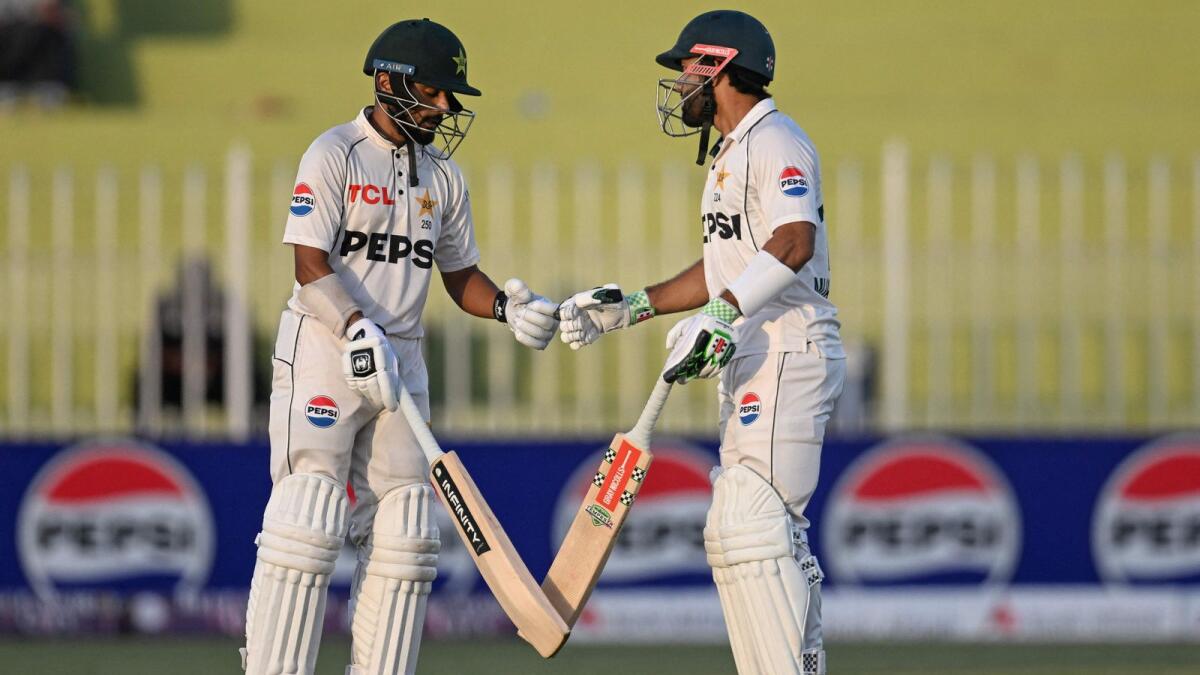Pakistan faced a challenging start on the rain-interrupted first day of the Test match against Bangladesh in Rawalpindi. Despite a shaky beginning, Saim Ayub and Saud Shakeel stepped up to the challenge and scored half-centuries to guide the hosts to 158-4 at stumps. Ayub scored 56 runs before falling victim to a loose shot, while Shakeel remained unbeaten on 57. The duo’s 98-run partnership steadied the ship for Pakistan after Bangladesh’s pace bowlers wreaked havoc following their decision to bowl first.
As the sun came out and batting conditions improved, Ayub and Shakeel took charge and led Pakistan to 81-3 at tea. They continued to accumulate runs in the final session until Ayub got dismissed in the 32nd over, edging a ball to slip off Hasan Mahmud’s bowling. Shakeel, who reached his seventh half-century in Test cricket, also became the joint-fastest Pakistani batsman to 1,000 Test runs alongside Saeed Ahmed. Mohammad Rizwan remained unbeaten on 24 at stumps, providing Pakistan with a solid foundation to build upon in their first Test under new head coach Jason Gillespie.
The day started with a delay due to a soggy outfield, and Pakistan faced an early setback when Abdullah Shafique’s dismissal for a loose shot left them at 0-1. Shoriful Islam then struck twice in quick succession to remove captain Shan Masood and Babar Azam, reducing Pakistan to 16-3. Masood’s dismissal was the subject of controversy as TV replays suggested that the ball had brushed his pad rather than the bat before being caught behind. Despite the early wickets, Ayub and Shakeel’s partnership helped Pakistan recover and finish the day on a more positive note.
Saud Shakeel’s resilient innings, along with crucial partnerships with Saim Ayub and Mohammad Rizwan, showcased Pakistan’s determination to fight back after a difficult start to the Test match. Shakeel’s milestone of becoming the joint-fastest Pakistani batsman to reach 1,000 Test runs highlights his promising potential in the team’s middle order. The players showed character and discipline in challenging conditions, particularly after losing early wickets, indicating a strong sense of resilience within the squad.
Pakistan’s newfound stability in the middle order, led by Shakeel’s solid batting, provides a glimpse of hope for their Test team’s future performances. The partnerships forged during the first day against Bangladesh suggest that Pakistan has the depth and talent to tackle tough situations and transform them into opportunities. Head coach Jason Gillespie’s influence and guidance appear to be making a positive impact on the team’s mindset and approach, which could lead to enhanced performances in upcoming fixtures.
Overall, Pakistan’s performance on the first day of the Test match against Bangladesh reflects a mix of challenges and opportunities for the team. While the early wickets and weather interruptions tested their resilience, the partnership between Ayub and Shakeel exemplified their ability to bounce back and build crucial innings. As Pakistan looks to capitalize on their solid start and continue their momentum into the following days of the Test match, the team’s potential under new leadership and evolving strategies presents an intriguing narrative for cricket fans and enthusiasts alike.











